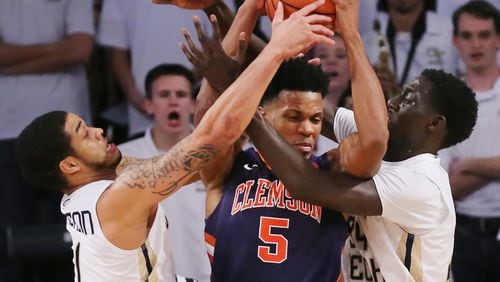Georgia Tech’s task on Saturday is a simple one: Win what is probably its most formidable game left on the schedule.
No. 16 Virginia, the Yellow Jackets’ opponent, is 36-2 in its past 38 ACC games at its John Paul Jones Arena. Moreover, the Cavaliers are a particularly bad matchup for the Jackets. With its vaunted pack line defense, Virginia is one of the least yielding defenses in the country, rated sixth nationally in adjusted efficiency by kenpom.com going into Friday’s games.
Tech is ranked 205th nationally in adjusted offense, 14th in the ACC. A team that often struggles to score figures to see its troubles magnified by the Cavaliers. The last time the Jackets faced a defense in Virginia’s echelon, Tech lost 65-50 to Louisville Jan. 7, its second lowest output of the season.
Tech is given a six percent chance of beating Virginia by the kenpom website, its lowest remaining win probability. That said, the Jackets were given a seven percent chance of upsetting North Carolina in their ACC opener on New Year’s Eve. (Tech’s season low was its 4 percent chance against Duke, proven in its 53-point defeat to the Blue Devils.)
The elder Jackets know Virginia’s capacity well. In the past two trips to Charlottesville, Va., Tech lost 82-54 in 2013 and then 57-28 in 2015. The latter defeat set an ACC record for fewest points in a conference regular-season game, even including games in the pre-shot clock era, and also was Tech’s lowest scoring output since the 1946-47 season.
“I’m just hoping we do better than last time,” center Ben Lammers said with a laugh. “Which I’m sure we will.”
The Jackets’ progress on offense will get a measuring stick Saturday. Tech shot 37 percent in its first three ACC games and averaged 12.3 assists against 14.3 turnovers. In the past three, the Jackets have made 47 percent of its field-goal attempts and averaged 19.7 assists against 11.3 turnovers.
“We’re obviously going to have to try to score, but I’m not as concerned about Virginia,” coach Josh Pastner said. “I’m more concerned about Georgia Tech, that we’ve got to just continue to improve.”
The unrelenting discipline that the Cavaliers exercise on defense will be a test of Tech’s patience and willingness to move the ball for open shots. Tech’s growing commitment to do that has helped the Jackets put up better numbers in the past three games, but that progress deserves a caveat.
Tech faced a much higher caliber of defense in the first three games (North Carolina, Duke and Louisville) than it did in the past three (Clemson, N.C. State, Virginia Tech).
Point guard Josh Heath and forward Quinton Stephens have picked up their play in particular. In this three-game stretch, Heath has made 10 of 14 field-goal attempts after making 18 of 57 in his first 11 games of the season and has 24 assists with 10 turnovers. Heath appears to have responded to Pastner’s dictum to the point guards to not overextend themselves, that they don’t have to win the games just as long as they don’t lose them.
Stephens is averaging 18.7 points per game with nine rebounds in the past three games. In that span, he has tied his career scoring high (22, against N.C. State) and set highs for rebounds (13, against Virginia Tech) and assists (five, against N.C. State). He has played 40 minutes in each of the past two games, joining Tech’s ironman legacy that includes Travis Best, Dennis Scott and Tom Hammonds. He is playing with confidence, looking for his shot within the flow of the offense and setting his feet on 3-pointers.
“Obviously at home, they’re a really tough team,” Stephens said. “They won (Wednesday). Like I said, we’ve just got to come and be aggressive and really buy in to what we do. I’m excited for the team.”
To prepare for the Cavaliers, Pastner made the unusual decision to keep the team in Virginia after its late-night game Wednesday at Virginia Tech. The team stayed overnight in Blacksburg, then bused to Charlottesville Thursday for practices mixed in with video review sessions and study halls.
“We appreciate it,” Stephens said of the donor support that makes such a decision possible. “We’ve got to come up with another win.”
Lammers approached the respite with ambivalence.
“I mean, it’s good because I’m not in class,” he said, “but I have homework due (Wednesday), (Thursday) and Friday. It’s the first week (of the semester, actually the second), so it’s not that killer, but it’s still engineering homework. I have a test Tuesday next week, actually.”
He acknowledged studying in a hotel room is not his strength.
“I’m one of those guys, I have a specific spot where I study,” he said. “I can do it other places, but it throws me off, so I like to be at my desk.”
About the Author







